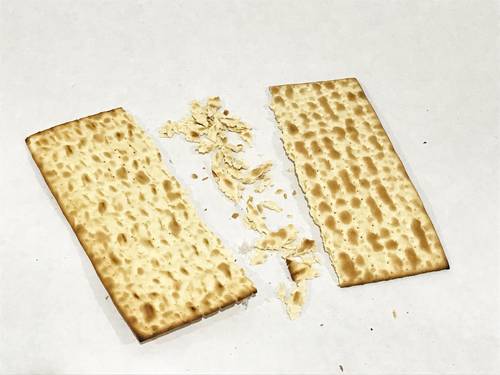A Practical Passover
04/06/2020 10:56:43 PM
Rabbi Boris Dolin
| Author | |
| Date Added | |
| Automatically create summary | |
| Summary |

I am sure I am not the only one who gets as much joy out of planning for our Passover seders as the seder itself. In past years, I would often spend at least a few weeks getting ready for the big day, revelling not as much in the cleaning as the preparation for this most experiential of our holidays. For me Passover was always a powerhouse moment in our calendar year; a home-based, food-focused, theatrical storytelling extravaganza, deeply relevant, profoundly meaningful, and of course, always exciting from beginning to end! Or, if nothing else, the seder was a nice opportunity to gather with family and friends for some good conversation and a hearty meal.
Nevertheless, once the matzos appeared on the supermarket shelves (but God forbid, never before), I knew it was time to start the planning. I would sit down with my family and go over the menu for the evening, ensuring that there was just enough of the required traditional foods along with a few “experimental” dishes to try out. I would check in with my guests, and figure out the details of what they would bring, narrowing down the list until I knew just what I had to buy and what we already had on hand.
Then, when I was able to build up the energy, I would head out on the adventure of shopping, an adventure that only got more exciting once I moved to Montreal and discovered the IGA in Cavendish and its towering mountain of matzo and hidden gems of kosher treats! With the food ready to go, I would sit down with a notebook and a pile of Haggadot, delicately creating a “map” of how I hoped to guide our guests through the seder. Never happy with just a simple reading of the text from start to finish, I found it necessary to fit in plenty of songs, discussion questions, a joke or two and a few sneaky games and tangents to keep the kids awake and interested.
Finally when the big day would come, the food was cooked, the table set, and the Haggadah was annotated and ready to go. I knew I was ready. Plenty of work to prepare, but the experience was always worth it.
This year, we all know that things will not be the same when we gather around our seder tables on Wednesday night. Of course there will be no large gatherings, but we also know that so many people in our community will be alone as the requirement to stay away from family and friends holds sway. The entire experience will be strange and new, and no amount of planning can prepare us for this year's holiday.
But it is not just a smaller guest list. I am sure for most of us our seders will be much more simple. Without all of the people to serve, we may just make a few of our favourite dishes or even just a warm bowl of soup. No need to overly decorate the table, or to deep clean the entire house just in case someone wanders into another room. This year, even if we manage to connect with others through Zoom or some of the other technologies available to us, around the table, I am sure it will still feel small. A humble simple seder, and maybe this is just what we need this year.
But just because the seder is simple doesn't mean it has to be any less meaningful. Even this year’s pandemic experience can be a powerful reminder of how we celebrate freedom, and an opportunity for deep reflection and learning. Here are some thoughts about how to make the best of our situation and make sure that this year’s seder is a good one:
Don’t worry about breaking with tradition! Passover is one of those holidays where every family has their own special way of doing things. There are the recipes, the rituals of making your way through the Haggadah, even the places that every guest sits at the table. These rituals are part of what makes the holiday so special, but if there was ever a year to break with tradition, this is it. You will be fine if you can’t motivate yourself to make your way through the Haggadah with as much energy as in past years, or if you can't cook the five course dinner you usually do. You may not even be motivated throughout the week of the holiday to feel so deeply connected with the act of eating Passover foods, when there are not as many people to share them with. But accept that you have other things on your mind. Like how you will survive so many more weeks of physical distancing. Or the health of your family and friends. Or the stability of our world. It is fine to make this year the least exciting seder you have ever had, because as we know, there is enough excitement going on beyond our dining room table.
Make this year a seder of storytelling. No, not just the story of Passover, we do that every year. This year, tell the stories that have really changed you; the stories that the seder is working so hard to squeeze out. Maybe you can hear from Bubbe or Zayde about how they survived some of the challenges of their childhoods, or from your own experiences in life, relationships and work. If you don’t have the stories to tell, go online and print up and read a story of an immigrant or an activist, or for that matter the health care workers and leaders of the current fight against the pandemic. There are too many powerful stories of survival and freedom out there, and if we truly want to make our seder come alive this year, these stories need to be told, now more than ever.
Don’t forget to ask questions, and don’t hold onto the tough ones. While we all need to have this Pesach to celebrate our freedom (and to eat too), there are some important questions that we need to ask this year. What has this pandemic done to our understanding of how we live in community and relate to each other? What specific things are we doing to take care of each other and our world to make sure that this does not become the new normal? How can we step forward into the unknown without losing hope? Don’t forget, a seder without questions, without deep and real questions, is only reading from a book.
Relax, and know that you are doing your best. Not just with the seder but with everything that has happened the past few weeks. You have been stressed, you have been more emotional than usual, and you may have not been yourself. Maybe you have lost your ability to focus in the way you used to, or are simply coming to terms with a new world of emotions, of confusion, fear and sadness. Maybe the seder will not be perfect, but you know what? Neither are we! If Passover reminds us of anything, it is that we have no choice but to take that imperfection and do our best to fix what we can, and make the commitment to reach towards something more hopeful in the year ahead. That final call of “Next Year in Jerusalem” is there for a reason. We have always lived in an imperfect world, but we also know what it means to fight to make it better
I keep trying to think otherwise, but I am pretty confident that this will not be the best Passover I have ever had. Like everything else in the past few weeks, it will be an experiment and most likely will have some moments of challenge and sadness. It will be simple. It will be strange. It may even be a bit lonely. But I think in some strange way, it also may be one of the most meaningful and powerful Jewish experiences I will ever have. And just like Passover itself, I know one thing for sure. Next year, what a story we will tell!
Congregation Dorshei Emet - 18 Cleve Rd., Hampstead, QC, H3X 1A6 - 514-486-9400
Home - About Us - Contact - Disclaimer
Privacy Settings | Privacy Policy | Member Terms
©2025 All rights reserved. Find out more about ShulCloud



